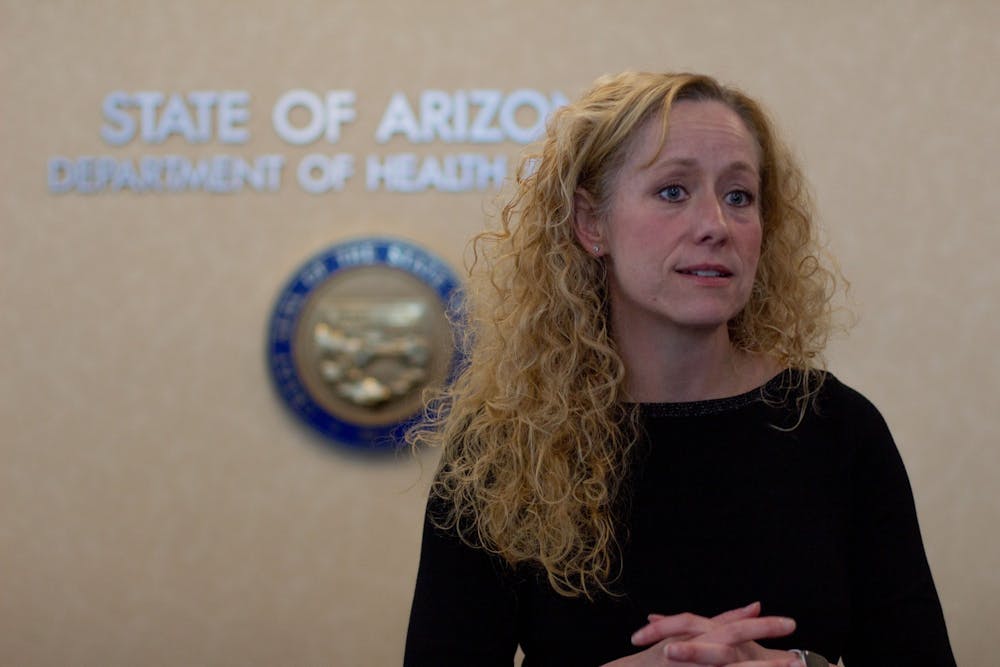An ASU community member has been diagnosed with the 2019 Novel Coronavirus, Arizona health officials said Sunday.
The Maricopa County resident had recently returned from Wuhan, China, and does not live in University Housing, according to the Arizona Department of Health Services.
"There is no indication that any ASU student has the coronavirus," wrote ASU Health Services in an announcement on its website. Officials could not confirm what their role in the ASU community is.
Out of precaution, the University "is following Maricopa County Public Health and the Centers for Disease Control protocols to screen and isolate anyone who may be at increased risk of exposure," according to its website.
ASU also sent out a mass email Sunday evening addressing the situation and offering students tips on how to avoid getting viruses.
Dr. Cara Christ, director of the Arizona Department of Health Services, convened a meeting with reporters Sunday afternoon and said that the Department will be working with the University to contain the spread of the virus.
"We will be working directly with the university and local public health in order to identify contacts and to bring them up, or to make sure that they are being followed and monitored for signs and symptoms of developing the illness," Christ said.
Officials also said the person is not severely ill and is voluntarily in isolation to prevent the illness from spreading. The individual may remain in isolation anywhere from a few days to a few weeks, and they are currently being treated and closely monitored at their own home, Christ said.
As of Jan. 26, there are five confirmed cases of coronavirus in the U.S. and more than a thousand cases in China, the central point of the virus, according to the CDC.
"Coronavirus spreads through the air when an infected person coughs or sneezes," according to the Arizona Department of Health Services' website. "Symptoms are thought to appear within two to 14 days after exposure."
While the CDC considers the virus "a very serious public health threat," based on current information, its immediate health risk to the general public is "considered low." However, Christ also said those who have underlying medical conditions are at a higher risk of having complications with the virus.
"The risk from these outbreaks depends on characteristics of the virus, including whether and how well it spreads between people, the severity of resulting illness, and the medical or other measures available to control the impact of the virus," according to the CDC's website.
Fever, cough, runny nose and difficulty breathing are all symptoms of 2019 Novel Coronavirus.
Preventative measures from the Arizona Department of Health Services' website include:
- Wash your hands often with soap and water for at least 20 seconds. If soap and water are not available, use an alcohol-based hand sanitizer.
- Avoid touching your eyes, nose, and mouth with unwashed hands.
- Avoid close contact with people who are sick.
- Stay home when you are sick.
- Cover your cough or sneeze with a tissue, then immediately throw the tissue in the trash.
- Clean and disinfect frequently touched objects and surfaces.
News of the virus spreading to ASU quickly reached students on campus through social media.
"I trust in ASU to do a good job handling it, they have enough personnel and experience to take care of it," said Nnamdi Chugbo, a freshman business and global politics major.
The 2019 Novel Coronavirus is a part of the family of infectious diseases called coronaviruses, according to the World Health Organization. These viruses are typically zoonotic, meaning they are transmitted from animals to humans.
Both the common cold and Severe Acute Respiratory Syndrome are included in the coronavirus family.
“I don't know that they've isolated it back to a specific source," Christ said. "What we do know is that coronaviruses are relative; they are found in animals. And so it could have been any animal-to-human contact."
State Press reporters Wyatt Myskow, Grace Lieberman and Stacy Brinson contributed to this report, along with editors Kimberly Rapanut, Andrew Howard and Adrienne Dunn.
Editor's Note: This is a breaking story and will be updated as more information becomes available. This story was updated on Jan. 26 at 2:30 p.m. to reflect that ASU Health Services claims, "There is no indication that any ASU student has the coronavirus." This story was updated on Jan. 26 at 8:12 p.m. to include comments from Christ and ASU community members.
Like The State Press on Facebook and follow @statepress on Twitter.




